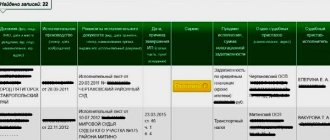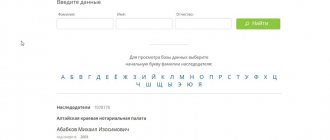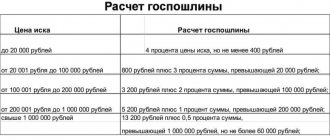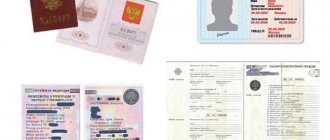Why look for a will?
The heir’s lack of information about the existence of an expression of will results in the impossibility of entering into inheritance.
Possible situations:
- The heir is an outsider . He may not know the testator's family members or may not have information about the death of the owner. Therefore, the testator must take care of transferring the order to the potential heir. Otherwise, the relatives of the deceased citizen may simply hide the fact that the administrative document was drawn up.
- The heir is a relative of the deceased. Relatives usually have access to documents or personal belongings of the deceased person. But failure to contact a notary in a timely manner will result in loss of property rights.
Example. Citizen M. transferred his property to his brother.
A year later he died. The son found out about his father's death and came to the city. He held his parent’s funeral and took the keys to the apartment from his uncle. The young man found an order in the documents and tore it up. Within the prescribed period, he submitted an application to accept the inheritance. The brother of the deceased man could not contact the notary, since he was the heir of the 2nd line. However, he knew where the declaration of will was drawn up. Therefore, I turned to a notary and took a duplicate of the document. Later, the man filed an application to become a driver. The testator's apartment went to him. The son was left without an inheritance.
Opening of inheritance at the place of last registration or at the location of the property
It would seem that it is very difficult to determine where to look for an inheritance matter. But let's take things in order.
If a citizen had permanent registration and lived at his place of registration, then in 99% of cases the inheritance case will be opened in this region. The right to conduct this case can belong to only one notary, whose department is the area of residence of the deceased. You can find out the notary's details at the notary's office.
If the deceased did not live according to registration, then, most likely, the inheritance case will be in the department of the notary responsible for the area where the bulk of the deceased’s property is located. If the deceased owned a lot of property, then the right to conduct the business will pass to the notary whose property in his jurisdiction will be more expensive relative to the market value of each individual unit of property
.
As for foreign property, the local Russian notary must independently contact a notary of another state and report the death of a citizen whose property is located abroad. After this, resolve issues of ownership of the left-behind property on the terms of compliance with local laws regarding inheritance.
Where is a will kept before and after death?
You can contact a notary to enter into an inheritance by expression of will only within 6 months after the death of the owner. Otherwise, the citizen loses the right to claim. Therefore, the testator must take care to transfer information about the disposition to the relevant heir.
The location of the document directly depends on the method of its execution. Possible options:
| No. | Title of the document | A comment |
| 1 | Notarial decree | The document is drawn up in 2 copies. One of them is kept in the notary's archives. The second sample is given to the testator. |
| 2 | Expression of will drawn up by a person replacing a notary | In special cases, the responsibility for certifying the order rests with the head physician of a hospital or nursing home, the head of a local government body, the commander of a military unit, or the head of an expedition. The document is drawn up in 2 copies. One is transferred to the testator. The second copy is sent within 30 days to the notary’s office at the place of residence of the testator. |
| 3 | Will made in emergency circumstances | The document is drawn up in a situation where the testator may be in danger of death. Therefore, it is made in 1 copy in simple written form and certified by 2 witnesses. The only copy is kept by the testator. For it to come into force, the heir must go to court. |
Important! A document certified by a person replacing a notary must be included in the register of notaries within 30 days. If it was drawn up shortly before the death of the testator, then the specialist might not have time to transfer the data. In this case, it is advisable to begin the search 30 days after the death of the owner.
Why is it important to find it?
The order comes into force only after the death of the person who indicated his last will. Until this time, the very fact of the existence of the paper, as well as the conditions contained in it, must remain closed (Article 1123 of the Civil Code of Russia).
The owner himself chooses to whom to transfer his property (Article 1119 of the Civil Code of the Russian Federation). At the same time, he has the right to remain silent about the choice made.
Established deadlines for accepting an inheritance
If a will is not found, then all the property and property of the deceased person will be transferred to his successors by law, in the order of their priority:
- Husband (wife), children, parents.
- Brothers and sisters, grandparents.
- To the siblings and half-brothers of the owner's parents (aunts and uncles).
- Subsequent relatives, as well as those who do not have blood ties with the testator (stepsons, stepdaughters, stepfather, stepmother).
Inheritance scheme by law
Note: a guaranteed share of the inheritance is received by persons who were dependent on the deceased.
Article 1119 of the Civil Code of the Russian Federation “Freedom of will”
Article 1123 of the Civil Code of the Russian Federation “Secrecy of a will”
How to find out if a deceased person left a will
Is it possible to find out about the existence of a document during the testator’s lifetime? No. The secrecy of expression of will is protected by law (Article 1123 of the Civil Code of the Russian Federation). The notary, executor of the will or witnesses have no right to disclose such information. Only the testator can notify the relatives of the will of the relatives.
After the death of the owner, information about the existence of a will is disclosed to relatives only if the recipient of the property appears at the notary by order. However, information about its availability can be obtained by citizens independently.
Let's look at how to find out which notary has a will. The simplest option for searching for a declaration of will is to search through a notary office. The Unified Notary Register will be operational in 2021.
The process of searching for a notarized will:
- Contact any notary office in the country.
- Presentation of the death certificate of the testator and personal documents of the potential heir.
- Obtaining information about the presence/absence of an order.
However, the notary will only report the location of the will. Information about its contents can only be provided by the specialist storing the document.
If a citizen knows where the declaration of will was drawn up, then he can contact the notary office where it is stored.
The right to receive a duplicate is vested (Article 52 of the Law on Notaries):
- heir;
- legatee;
- executor of the will.
Is it possible to refuse to inherit?
Many people decide to refuse an inheritance for some reason. They usually do this in favor of one of the family members. It is certainly possible to do this procedure.
To refuse, you must, within six months from the date of death of a relative, declare your decision in favor of some other family member. It is very important to contact a law firm in a timely manner so that in the future there will be no additional problems with resolving this issue.
Of course, many are interested in how to find out about a will after death, find it and, most importantly, enter into inheritance rights. It is quite difficult to understand this issue on your own. To do this, it is necessary, as mentioned above, to go to various offices, collect all kinds of information, and so on. For many people, this process may seem long and complicated, especially if there is not much time for this procedure.
An excellent way out of this situation would be to contact a law firm. We will explain how to find out if a deceased relative has a will and how to enter into inheritance. It is much easier to work with professional lawyers who have extensive experience in various issues of this kind.
We will answer all your questions and will definitely help! Call us right now on the Hotline (812) 425 31 40 and get legal advice!
How to find a will by last name online
In 2021, there are many options for seeking a will. However, it is still impossible to obtain information online.
The law establishes the secrecy of a will, so information about the existence of a document is confidential, even after the death of the owner.
Expert opinion
Stanislav Evseev
Lawyer. Experience 12 years. Specialization: civil, family, inheritance law.
However, to help heirs, there is a new service for finding the notary who opened the inheritance case. Such information can help if there is more than one heir.
One of the recipients of property under a will contacts a notary. The specialist opens a probate case and enters data into the register. After which other heirs, by expression of their will, can receive information about the place of opening of the inheritance.
The service is located on the website of the Federal Notary Chamber. It is easy to use, so the heir does not need to have special knowledge.
Data required to use the service:
- FULL NAME. deceased;
- Date of Birth;
- Date of death.
This is what the service looks like
What you need to pay attention to:
- The testator's data must be entered in strict sequence, full name.
- If you do not have accurate data on the birth and death of a citizen, you may not enter such information. The service will provide a list of all testators with such data.
- The service does not contain data on the presence/absence of expression of will.
- If the site does not provide information about the testator, then the inheritance case has not yet been opened. This means that other heirs did not apply to the notary’s office to receive the property.
The service will not help you find an order. However, he will assist in finding the notary who opened the inheritance case.
Method 3: Registry
Recently, notaries have been required to record information about a will in a unified register. It contains information:
- personal data of the author;
- notary data: name, address;
- number of the will in the personal register of the notary.
It is impossible to find out the contents of a document from the register, but it is possible to obtain information about where a copy may be stored. Usually the request is made by a notary who is in charge of the inheritance case, at the request of relatives.
Important: the will for the deposit is kept in the bank where it was issued. As soon as the investor dies, his account is frozen until the heirs take over their rights. If the contribution is bequeathed, information about this is sent to the notary who opened the inheritance case.
How to find out about a will for a non-relative
The peculiarity of inheritance at the disposal of the deceased is the possibility of the absence of family ties between the testator and the recipient.
The heir may be:
- outsider;
- cohabitant;
- state;
- organization;
- inheritance fund.
Therefore, the question of searching for an expression of will is of particular importance. Data on the availability of the order will be communicated to any applicant at any notary office that has access to the unified register of notaries.
Financial expenses
Since 2005, persons who received an inheritance are not required to pay tax on inherited property. But you will still have to incur expenses - pay a state fee for registration by a notary of all documents allowing you to enter into inheritance rights. According to the legislation of the Russian Federation, the amount of payment depends on:
- The presence or absence of a relationship between the heir and the testator.
- The value of inherited property.
So for immediate relatives, the state duty will be 0.3% of the value of the inheritance, up to a maximum of 100 thousand rubles. Distant relatives or unrelated persons will pay 0.6% to the state, maximum 1 million rubles.
Attention! A notary does not have the right to independently evaluate his services. The amount of the state duty is established only by law.
Property can be valued at cadastral, inventory or market value - at the discretion of the heir.
Our specialists have prepared for you other materials on the topic of wills. Read about:
- what types of this document are there;
- how to challenge;
- how much does it cost to register with a notary?
- what is the secrecy of a will;
- how to change or cancel;
- Which is better - a will or a deed of gift?
Finding a Will Made in Emergency Circumstances
If a citizen was in conditions that could cause his death, then the order is issued:
- in simple written form;
- with one's own hand;
- certified by 2 witnesses.
In case of termination of special conditions, the testator must certify the document by a notary within 30 days. Otherwise, the expression of will loses force.
If the citizen did not have time to certify the order, then the document can only be found in the personal belongings of the deceased . If an order is found, the heir must apply to the court to recognize the circumstances as extraordinary.
Actual acceptance of inheritance
Judicial panel for civil cases of the Moscow City Court, consisting of presiding judge Gornova M.V.,
and judges Vishnyakova N.E., Bykovskaya L.I.,
under secretary M.,
having heard in open court the report of judge N.E. Vishnyakova. civil case on appeal Z.E.Yu. on the decision of the Cheryomushkinsky District Court of Moscow dated September 6, 2017, which decided:
Establish the fact of acceptance of T.N. inheritance that opened after the death of O.T., who died * years.
Determine the share of O.T. in the common property of the spouses in the form of 1/2 share in the ownership of the apartment at the address: *, including the specified share in the inheritance mass after the death of O.T.
Recognize for T.N. ownership of * a share of the apartment at: * by inheritance.
Recognize as Z.E.Y. ownership of 5/6 shares of the apartment at address * by inheritance.
The decision is the basis for making a record of T.N.’s ownership in the Unified State Register of Real Estate. for a 1/6 share of the apartment at the address: * and about the ownership of Z.E.Yu. for 5/6 shares of the specified apartment.
installed:
T.N. filed a lawsuit against Z.E.Yu. on establishing the fact of acceptance of the inheritance, allocating a share in the common property of the spouses, including the property in the hereditary mass, recognizing the right of ownership in the order of inheritance by law, motivating their demands by the fact that * her mother died - O.T., her heirs first daughters appeared in turn - T.N. and Z.E.Yu., as well as husband O.Yu., who died * years ago. During the period of marriage, namely 08/16/2002, the parents of the plaintiff and defendant in the name of O.Yu. purchased apartment N * in house * under a sales contract. On the day of death of O.T. permanently resided at *. After the death of her mother, the plaintiff took her personal belongings (precious jewelry, household items and documents). Also, after O.T.’s funeral, which was handled by the plaintiff, she disposed of her mother’s belongings and gave her daughter her grandmother’s ring and bracelet. Within the period established by law, the plaintiff did not apply to the notary to accept the inheritance, but believes that, having completed the above actions, she actually accepted the inheritance left after the death of O.T.
The plaintiff and her representative at the court hearing supported the claim on the grounds set out in it.
The defendant and her representative did not admit the claims, believing that the plaintiff did not provide sufficient evidence indicating the actual acceptance of the inheritance.
The court made the above decision, the cancellation of which, as illegal and unfounded, according to the arguments of the appeal, Z.E.Yu.
Having checked the case materials, having listened to the representative of the plaintiff - Vorobyov A.S., the defendant Z.E.Yu., her representative - S.O., having discussed the arguments of the appeal, the judicial panel comes to the conclusion that there are no grounds for canceling the appeal decision made in accordance with the actual circumstances of the case.
In accordance with Art. 195 of the Code of Civil Procedure of the Russian Federation, the court’s decision must be legal and justified.
In accordance with Resolution of the Plenum of the Supreme Court of the Russian Federation No. 23 of December 19, 2003, a decision is legal when it is made in strict compliance with the rules of procedural law and in full compliance with the rules of substantive law that are subject to application to a given legal relationship, or is based on the application, in necessary cases, of an analogy of law or an analogy of law (part 1 of article 1, part 3 of article 11 of the Code of Civil Procedure of the Russian Federation).
The decision is justified when the facts relevant to the case are confirmed by evidence examined by the court, satisfying the requirements of the law on their relevance and admissibility, or by circumstances that do not require proof (Articles 55, 59 - 61, 67 of the Code of Civil Procedure of the Russian Federation), and also when it contains exhaustive conclusions of the court arising from the established facts.
The decision of the court of first instance fully complies with these requirements of the law.
By virtue of Art. 264 of the Code of Civil Procedure of the Russian Federation, the court establishes the facts on which the emergence, change, termination of personal or property rights of citizens depends, including the fact that title documents (with the exception of military documents, passports and certificates issued by civil registry authorities) belong to the person, name, patronymic or whose last name indicated in the document does not coincide with the first name, patronymic or last name of this person indicated in the passport or birth certificate; the fact of acceptance of the inheritance and the place of opening of the inheritance.
In accordance with Art. 1111 of the Civil Code of the Russian Federation, inheritance is carried out by will and by law. Inheritance by law takes place when and insofar as it is not changed by a will, as well as in other cases established by this Code.
In accordance with Art. 1112 of the Civil Code of the Russian Federation, the inheritance includes things and other property that belonged to the testator on the day the inheritance was opened, including property rights and obligations. The inheritance does not include rights and obligations that are inextricably linked with the personality of the testator, in particular the right to alimony, the right to compensation for harm caused to the life or health of a citizen, as well as rights and obligations, the transfer of which by inheritance is not permitted by this Code or other laws . Personal non-property rights and other intangible benefits are not included in the inheritance.
According to Part 2 of Art. 1153 of the Civil Code of the Russian Federation, it is recognized, until otherwise proven, that the heir accepted the inheritance if he performed actions indicating the actual acceptance of the inheritance, in particular, if the heir: took possession or management of the inherited property; took measures to preserve the inherited property, protect it from encroachments or claims of third parties; made at his own expense expenses for the maintenance of the inherited property; paid at his own expense the debts of the testator or received funds due to the testator from third parties.
In accordance with paragraph 36 of the Resolution of the Plenum of the Armed Forces of the Russian Federation No. 9 “On judicial practice in cases of inheritance,” the commission by the heir of actions indicating the actual acceptance of the inheritance should be understood as the commission of actions provided for in paragraph 2 of Article 1153 of the Civil Code of the Russian Federation, as well as other actions management, disposal and use of inherited property, maintaining it in proper condition, which manifests the heir’s attitude towards the inheritance as his own property.
Such actions, in particular, may include: the heir moving into the residential premises belonging to the testator or living in it on the day of opening of the inheritance (including without registering the heir at the place of residence or place of stay), the heir's processing of the land plot, filing a lawsuit applications for the protection of their inheritance rights, requests for an inventory of the testator's property, payment of utilities, insurance payments, reimbursement from the inherited property of expenses provided for in Article 1174 of the Civil Code of the Russian Federation, other actions regarding the possession, use and disposal of inherited property. Moreover, such actions can be performed both by the heir himself and by other persons on his behalf. These actions must be completed within the period for accepting the inheritance established by Article 1154 of the Civil Code of the Russian Federation.
Based on Art. 1141 of the Civil Code of the Russian Federation, heirs by law are called upon to inherit in the order of priority provided for in Articles 1142 - 1145 and 1148 of this Code. The heirs of each subsequent queue inherit if there are no heirs of previous queues, that is, if there are no heirs of previous queues, or none of them has the right to inherit, or all of them are excluded from inheritance, or deprived of inheritance, or none of them accepted the inheritance, or all they refused the inheritance. Heirs of the same line inherit in equal shares, with the exception of heirs inheriting by right of representation.
In accordance with Art. 1112 of the Civil Code of the Russian Federation, the inheritance includes things and other property that belonged to the testator on the day the inheritance was opened, including property rights and obligations.
According to Part 2 of Art. 218 of the Civil Code of the Russian Federation, in the event of the death of a citizen, ownership of the property belonging to him passes by inheritance to other persons in accordance with the will or law.
As established by the court and follows from the case materials, T.N. and Z.E.Y. are daughters of O.T. and O.Yu. FROM. died * years ago. After her death, no one applied for acceptance of the inheritance within the period established by law. Moscow notary F. applied to the property of O.T. an inheritance case was opened at the request of T.N., filed on 02/02/2017.
After the death of O.T. an inheritance opened in the form of a 1/2 share of apartment N * in the house *. The heirs of the first stage were the daughters of O.T. (plaintiff and defendant), as well as spouse - O.Yu. O.Yu. died *, the inheritance case to his property was opened by the notary of Moscow S.Z. according to the statement of Z.E.Yu. dated November 26, 2016. Also with an application for acceptance of the inheritance after the death of O.Yu. On January 12, 2017, T.N. contacted
From the materials of the inheritance case to the property of O.Yu. It is seen that during his lifetime, namely on 02/26/2014, he made a will in favor of Z.E.Yu., which was not canceled or changed.
During the period of marriage, in 2001, spouse O. addressed to O.Yu. purchased apartment N * in the building * k. * on the street. * according to the purchase and sale agreement.
In satisfying the claims, the court of first instance proceeded from the fact that T.N.’s arguments were confirmed at the court hearing. that she performed actions indicating the actual acceptance of the inheritance, accepting O.T.’s personal belongings, as well as accepting the fulfillment of obligations under the loan agreement.
The court also indicated that the disputed apartment was purchased during the marriage of O.T. and O.Yu. and is their common property, which belonged to the spouses in equal shares, having satisfied the requirements for the allocation of the marital share of O.T. and inclusion of 1/2 share of the apartment in the estate after her death.
The panel of judges considers it possible to agree with the conclusion of the trial court, since it is legal and reasonable and does not contradict the norms of current legislation.
In his complaint Z.E.Yu. refers to the fact that T.N. the statute of limitations has expired for filing claims to establish the fact of acceptance of the inheritance, as well as for filing claims for the allocation of the marital share from the property acquired during the marriage of O.T. and O.Yu.
The panel of judges does not agree with this argument due to the following.
In accordance with Art. 195 of the Civil Code of the Russian Federation, the limitation period is the period for protecting the right under the claim of the plaintiff, whose right has been violated.
According to Art. 196 of the Civil Code of the Russian Federation, the general limitation period is set at three years.
By virtue of Part 2 of Art. 199 of the Civil Code of the Russian Federation, the limitation period is applied by the court only upon the application of a party to the dispute made before the court makes a decision. The expiration of the limitation period, the application of which is declared by a party to the dispute, is the basis for the court to make a decision to reject the claim.
Based on clauses 1, 2 of Art. 200 of the Civil Code of the Russian Federation, the limitation period begins from the day when the person learned or should have learned about the violation of his right. Exceptions from this rule are established by this Code or other laws. For obligations with a specific performance period, the limitation period begins upon the expiration of the performance period.
The panel of judges recognizes the court's conclusions on establishing the fact of the plaintiff's acceptance of the inheritance as legal, based on admissible written evidence and the plaintiff's explanations. Legally significant actions were performed by him within the six-month period established by law and give rise to legal consequences in the form of recognition of ownership of the inherited property. Thus, the plaintiff did not expire the limitation period.
The claims of heirs for the allocation of a share in the common property of the spouses are subject to a general limitation period (3 years), which begins from the day when the person learned or should have learned about the violation of his right.
The plaintiff learned about her violated right only after contacting the notary S.Z. in January 2021 with an application to accept the inheritance, when the notary informed her of the existence of a will dated February 26, 2014, according to which O.Yu. bequeathed the disputed apartment to Z.E.Yu., therefore, the statute of limitations has not expired.
A reference in a complaint to disagreement with the court’s assessment of the evidence also does not entail the cancellation of the court’s decision, since the determination of circumstances relevant to the case, as well as the request, reception and evaluation of evidence for the notary , in accordance with Art. Art. 56, 59, 67 of the Code of Civil Procedure of the Russian Federation, falls within the exclusive competence of the court of first instance.
The court assessed all the evidence presented, including the testimony of witnesses questioned at the court hearing, as well as material evidence that was examined at the court hearing.
Under such circumstances, the court came to a reasonable conclusion that the claims made by the plaintiff were proven.
At the same time, the reference in the complaint to the fact that the possible demonstration of jewelry is not proof of their ownership and the basis for establishing the fact of acceptance of the inheritance cannot lead to the cancellation of the decision of the court of first instance, since at the meeting of the judicial panel the jewelry was examined: a gold bracelet with an engraving “to mom” from Natasha", a gold ring with precious stones - emerald and diamonds with the engraving "O.T.A."
A reference in the complaint to the fact that a power of attorney was attached to the statement of claim by way of subrogation, while the main power of attorney was not attached, and therefore the court, in the opinion of the applicant, should have returned the statement of claim, cannot lead to the cancellation of the court decision, since At the meeting of the judicial panel, the representative of the plaintiff presented the main power of attorney N * dated 02.02.2017 from T.N. in the name of T.S., who subsequently issued a power of attorney N * dated July 14, 2017, in the order of reassignment to the name of R., on whose behalf the statement of claim was signed and filed in court.
The conclusions of the court's decision are confirmed by the case materials, which the court gave a proper assessment. The court determined the legally significant circumstances correctly. The arguments of the appeal do not contain circumstances that refuted the conclusions of the court decision and are aimed at a different assessment of the evidence, which is not a basis for overturning the court decision.
Based on the above, guided by art. Art. 328 - 329 Code of Civil Procedure of the Russian Federation, judicial panel
determined:
The decision of the Cheryomushkinsky District Court of Moscow dated September 6, 2017 is left unchanged and the appeal is not satisfied.










